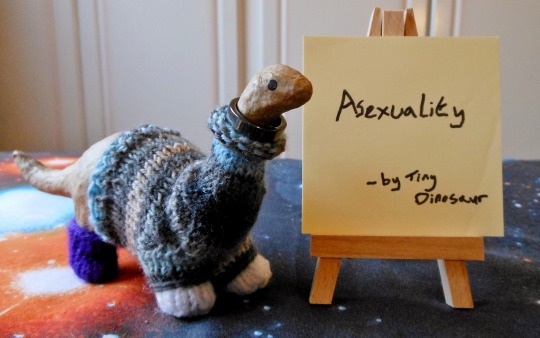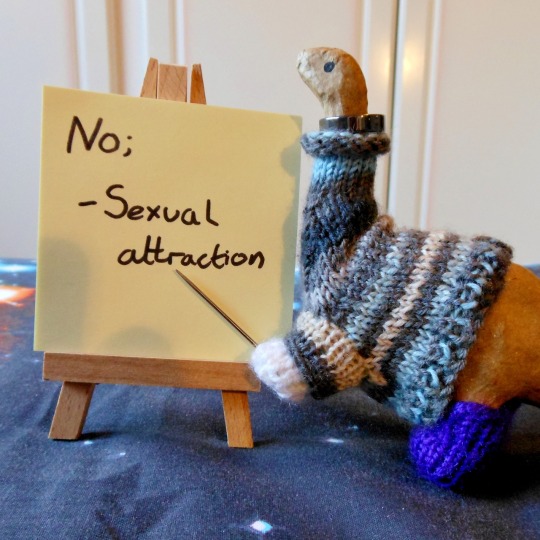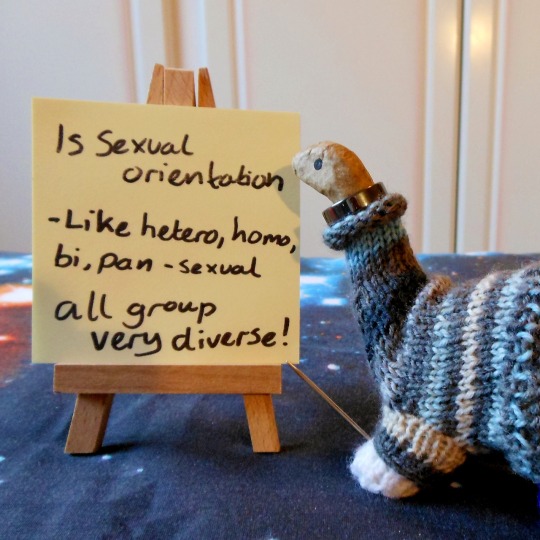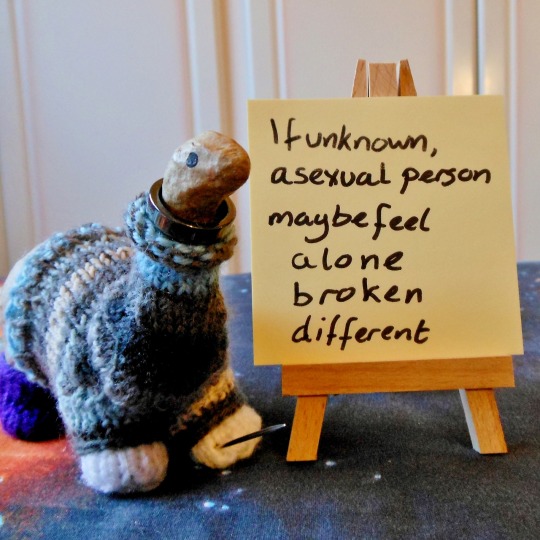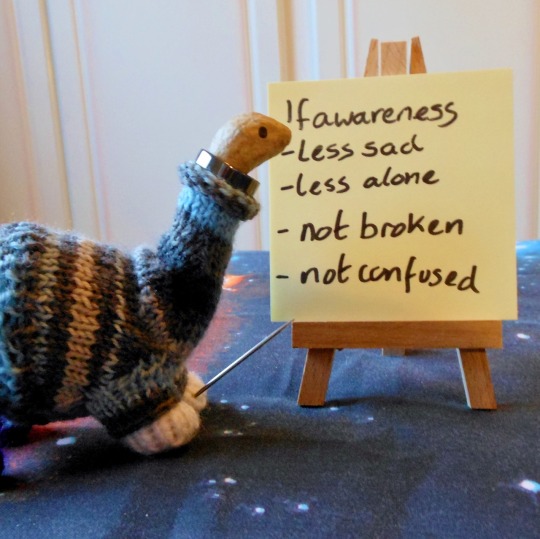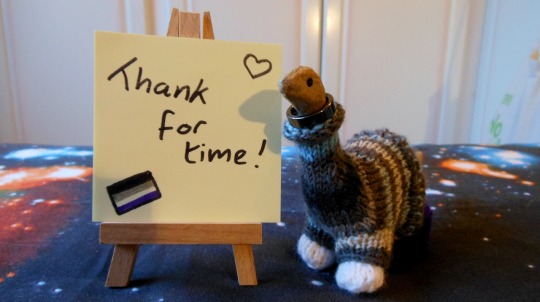•Writer • Artist • Goth at Heart• I'm a writer of LGBT+ content, Gothic Fiction and Consent is Sexy Romance without much of the actual sexy. I'll discuss writing topics/advice on this Blog and my own projects
Don't wanna be here? Send us removal request.
Note
I'm writing historical fiction and I'm reading a lot of contradicting information on the time period and different interpretations of events. Is it best to write with the version of history most people are familiar with or use the more modern, revisionist interpretation?
Eep, okay, well I’m sorry to hear the research isn’t going well. Do make sure you’re researching in the right places and the stuff you’re reading is by actual historians/professionals and not Joe Bob or Rainbow Mountain’s Blog of Skewed Opinions (unfortunately either can also be “professionals”). Don’t use the “revisionist interpretation” unless it’s genuinely concrete and accurate, as opposed to an inaccurate and biased “version” of history we’re familiar with. Sometimes history surprises you. Sometimes your teachers are wrong. Sometimes people really want history to look their way when it didn’t. Learn to be discerning.
If it’s simply an area of history that was not well documented or was from a time that could not be recorded, it’s possible we still don’t have the accurate history. Therefore, theories will fly and “information” will be contradictory. I say this only because I’ve had asks expecting non-existent historical info from me, lol.
Go to a library or an actual online database if the era/location/events you’re researching are not showing up on the first page of Google or all you’re getting is conflicting info.
May I ask what era you’re researching? It’s possible you’re just having a research issue and I might be able to help (I can reply in private if you’d like).
147 notes
·
View notes
Text
Allow yourself to be a beginner. No one starts off being excellent.
218K notes
·
View notes
Text
How I think I’m writing: Using eye contact, or lack thereof, to display emotions such as intimacy, shock, denial, or nervousness.
How I’m actually writing: She looked at me, and I looked away. I tried to look back, but she was already looking at the sky. “Look,” she sighs, looking back at me for a split second. “I don’t know how to say this.” We looked at each other and time stopped, but then she looked her lookers at something else to look at, looking tired.
78K notes
·
View notes
Text
Handwriting Vs Typing
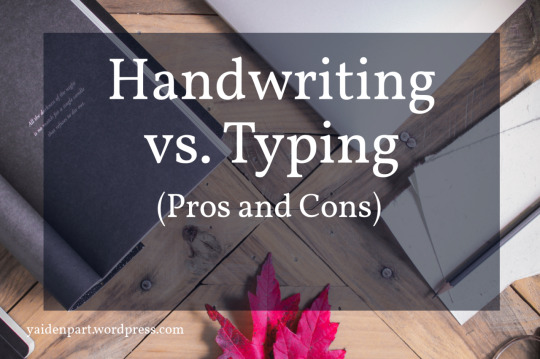
In this day and age, it’s common practice to write your stories on the computer. Some eccentrics let their 19. century author self-run free by using a typewriter for the Aesthetic, but, in general, most people toe the line. And then, well, we have the rare breed of writers who handwrite. Rumor has it they’re extinct, but daring folks have been known to spot one or two in the wild, building shelters from old notepaper and gnawing at ink cartridges to survive.
….and I used to be one of them.
For years, I swore to handwriting and honestly, I still kind of do. In spite of having switched over to typing, I feel handwriting at one stage in your drafting can be very beneficial to your process. But whether to go through with it completely is a more difficult decision.
And seeing as I’m familiar with both sides of the coin, I’ll aid you in making a personally beneficial choice.
So let’s figure out if handwriting is for you.
Pro’s of Handwriting
Imagine, you’re at your desk and need to write an idea down quickly. You could turn your laptop on, or grab a napkin and scribble in two seconds flat without having to open an app first. Physically move things around when outlining, quickly add arrow and colors, and easily look at several pieces of paper at the same time while writing. It’s simply said a more organic and immediate affair.
And so is revising by hand. There is a reason why many editors still demand printed copies of your manuscripts, I’ve noticed a certain screen blindness overcomes you when you’ve stared at a document for ten hours straight, blurring every paragraph into mush. The distance between the keyboard and the letters appearing on the screen leaves an artificial aftertaste like fake grape juice sticking to the roof of your mouth.
Handwriting not only strikes a more natural connection to your brain but also motivates extremely. Once you filled a notebook up you can hold milestones in your fingers, trace every physical accomplishment you’ve made. Even if the notebook fills up to the brim when you’re only at the half point mark of your story – kind of turning the victory stale as you grope for the next notebook to continue – it still serves as a way to keep track of your project that’s more physical and satisfying than a digital word count.
Speaking of word counts, this brings us to our most crucial point: deleting.
Or more, compulsive deleting and ‘editing’ while in the trenches of writing your first draft, the unspoken bane of all writers. Editing as you go is a terrible life choice for most people, and I thank past me every day for choosing to write by hand so I didn’t have to deal with that burden as a newbie on top of everything else. Basically, editing as you go will prevent you from achieving the peak of your productiveness by trapping you in a vicious cycle of editing and deleting which at the end of the day won’t have gotten you any further along the path of completing your story. However, writing by hand makes it more difficult for this cycle to lure you into its clutches. The only way for you to delete sections in by scratching them out or by drawing crazy mind maps with arrows along the page borders. And this forces you to silence your perfectionist urges and get the draft on paper in one go instead of editing every single line to death and never finishing anything.
Another viable reason to consider switching to handwriting could be your health, many people suffer from carpal tunnel or other issues like eye strain through working on a computer. And there is absolutely no shame in putting your health first.
Cons
Now after waxing poetic about writing by hand for 400 words, it’s time to reveal the big con which prompted me to jump ship after years of dedicated handwriting. It is-
-Dramatic Pause-
Having to write your draft two times when you want it as a digital file.
Which turned into a problem because redoing things unnecessarily like this grew to too much of a strain on my hands, even if it was just writing the story twice. Though I’m aware most people probably won’t encounter this particular problem. So the only thing left to take into consideration for you, my friendo, is the time extensiveness inherited to becoming an ink cartridge gnawer. If you’re especially inpatient having to spend time on retyping your story might not be a compromise you’re willing to make.
One of the pros previously mentioned is actually a con in disguise. The limited line editing capability of handwriting turns into a disadvantage when your issues don’t lie with perfectionism but with underwriting. I like to go back and forth on the page, adding content to paragraphs I’ve written before while simultaneously slapping on new sentences. This method is less accomplishable on paper and leads to underwritten stories being, well, extremely underwritten. At least until they’re through a few edit rounds on the computer, sweat lining your brow as revision evolves into a Herculean effort without your consent.
If you’re an underwriter typing is a blessing preventing you from having to go through hell later on in revision. But does typing have actual cons as well? Probably. Hopefully. Or this post will end on a pretty weak note.
Typing and all that Jazz
The pros of typing are obvious, modern world wouldn’t get by without someone happily tipping away on a keyboard or screen.
I personally changed my process from manual to working on a tablet for several reasons, including the flat screen being the closest to paper I could find while keeping the advantage of not having to transcribe my writing to a digital format.
But for you handwriting might be very well worth it. It does have many benefits, and typing could just annoy you enough to try.
The cons of typing include but are not limited to Enablement of Perfectionism™, as we talked about before in the pros of handwriting. Typing enables by tempting us into editing and editing, backspacing and deleting whole chunks of our work instead of continuing to actually write, giving off the illusion of productivity which later on reveals itself to be hollow when it turns out you only managed to write 50 words in five hours.
So if you struggle with that syndrome, I seriously recommend handwriting, it might sound painful at first not to edit, but constant perfectionism while drafting will be the true fatal foe that’ll stop you from attaining your goals.
Otherwise, pros of typing are the instant gratification of showing someone your work per google docs or other means, as well as the high working speed you’re able to reach. As well as the fact that computers are an all constant, making it easy to sneak a bit of writing in while at work without being forced into rewriting it at home to add it to your original project file. The cons and pros of both methods kind of tangle and interplay with each other, at the end it’s a purely personal decision which you choose, but I hope this post gave you some thought chew about which way is actually best suited to your workflow.
Pretty unsatisfying conclusion, huh? No straightforward answer saying what’s best for everyone. But that’s life folks, everything is all confusing subjectivity and grey areas and then you die.
1 note
·
View note
Text
I always hate it when people are all “so do you go to school, or are you working, or” and I either have to
make up some lie, or
eventually get around to “I am not working because of depression/anxiety,” and subsequently have to deal with whatever bullshit-riddled and completely unsolicited opinions on mental illness this stranger feels obligated to share with me.
So my therapist was like, “You don’t have to do either. You can just say you haven’t worked in a while because you’re recovering from an illness.”
I tried it when the home inspector was here today, and it fucking worked. He was like, “oh, I’m sorry, are you doing better now,” and I’m like yeah, and don’t worry, it’s not contagious, awkward laugh, and we moved on.
MY THERAPIST. IS A GENIUS. Because it is an illness, so it’s not a lie to say that, and it’s also none of his business to know specifically what it is, and I clearly don’t want to give more details, so we should move on from this topic. MY THERAPIST IS A GODDAMN GENIUS.
323K notes
·
View notes
Text
Resources For Writing Sketchy Topics
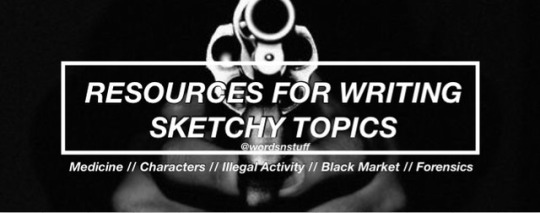
Medicine
A Study In Physical Injury
Comas
Medical Facts And Tips For Your Writing Needs
Broken Bones
Burns
Unconsciousness & Head Trauma
Blood Loss
Stab Wounds
Pain & Shock
All About Mechanical Injuries (Injuries Caused By Violence)
Writing Specific Characters
Portraying a kleptomaniac.
Playing a character with cancer.
How to portray a power driven character.
Playing the manipulative character.
Portraying a character with borderline personality disorder.
Playing a character with Orthorexia Nervosa.
Writing a character who lost someone important.
Playing the bullies.
Portraying the drug dealer.
Playing a rebellious character.
How to portray a sociopath.
How to write characters with PTSD.
Playing characters with memory loss.
Playing a pyromaniac.
How to write a mute character.
How to write a character with an OCD.
How to play a stoner.
Playing a character with an eating disorder.
Portraying a character who is anti-social.
Portraying a character who is depressed.
How to portray someone with dyslexia.
How to portray a character with bipolar disorder.
Portraying a character with severe depression.
How to play a serial killer.
Writing insane characters.
Playing a character under the influence of marijuana.
Tips on writing a drug addict.
How to write a character with HPD.
Writing a character with Nymphomania.
Writing a character with schizophrenia.
Writing a character with Dissociative Identity Disorder.
Writing a character with depression.
Writing a character who suffers from night terrors.
Writing a character with paranoid personality disorder.
How to play a victim of rape.
How to play a mentally ill/insane character.
Writing a character who self-harms.
Writing a character who is high on amphetamines.
How to play the stalker.
How to portray a character high on cocaine.
Playing a character with ADHD.
How to play a sexual assault victim.
Writing a compulsive gambler.
Playing a character who is faking a disorder.
Playing a prisoner.
Portraying an emotionally detached character.
How to play a character with social anxiety.
Portraying a character who is high.
Portraying characters who have secrets.
Portraying a recovering alcoholic.
Portraying a sex addict.
How to play someone creepy.
Portraying sexually/emotionally abused characters.
Playing a character under the influence of drugs.
Playing a character who struggles with Bulimia.
Illegal Activity
Examining Mob Mentality
How Street Gangs Work
Domestic Abuse
Torture
Assault
Murder
Terrorism
Internet Fraud
Cyberwarfare
Computer Viruses
Corporate Crime
Political Corruption
Drug Trafficking
Human Trafficking
Sex Trafficking
Illegal Immigration
Contemporary Slavery
Black Market Prices & Profits
AK-47 prices on the black market
Bribes
Computer Hackers and Online Fraud
Contract Killing
Exotic Animals
Fake Diplomas
Fake ID Cards, Passports and Other Identity Documents
Human Smuggling Fees
Human Traffickers Prices
Kidney and Organ Trafficking Prices
Prostitution Prices
Cocaine Prices
Ecstasy Pills Prices
Heroin Prices
Marijuana Prices
Meth Prices
Earnings From Illegal Jobs
Countries In Order Of Largest To Smallest Risk
Forensics
arson
Asphyxia
Blood Analysis
Book Review
Cause & Manner of Death
Chemistry/Physics
Computers/Cell Phones/Electronics
Cool & Odd-Mostly Odd
Corpse Identification
Corpse Location
Crime and Science Radio
crime lab
Crime Scene
Cults and Religions
DNA
Document Examination
Fingerprints/Patterned Evidence
Firearms Analysis
Forensic Anthropology
Forensic Art
Forensic Dentistry
Forensic History
Forensic Psychiatry
General Forensics
Guest Blogger
High Tech Forensics
Interesting Cases
Interesting Places
Interviews
Medical History
Medical Issues
Misc
Multiple Murderers
On This Day
Poisons & Drugs
Police Procedure
Q&A
serial killers
Space Program
Stupid Criminals
Theft
Time of Death
Toxicology
Trauma
297K notes
·
View notes
Text
“i am a monument to all your sins” is such a fucking raw line for a villain it’s amazing that it came from halo, a modernish video game, and not some classical text or mythos
563K notes
·
View notes
Text
You name your book character knowing full well that that isn’t their name. You don’t know what their name is, but it isn’t that. There’s a name somewhere that fits, but you haven’t unlocked that information yet. Maybe you knew once. Maybe you never will. Your character has the wrong name.
6K notes
·
View notes
Text
some notes on POV
I wanted to type up a little rundown of quick n dirty writing tips based on things I see a lot in fic/ amateur original manuscripts, and, uh, it turned out that they all revolved around POV. Nailing point of view in fiction writing is both crucial and one of the least intuitive building blocks of writing to learn: an understanding of POV has been the only useful thing i took from my college creative writing classes, and god knows how long I’d have stumbled along without it otherwise.
So! I am saving you, baby writer, the trouble of slogging through a miserable writing class with a professor who’s bitter as FUCK that genre fiction sells better than his “sad white man drinking” lit fic novels. Here are some assorted writing tips/ common mistakes and how to fix them, as relating to POV:
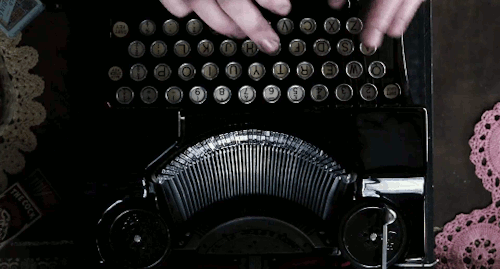
(this turned into a WALL OF TEXT so i will be using gifs to break it up)
> “I watched the ship tilt” “he saw the sky darken” “she noticed flowers growing on the rusted gate.” no. If the character who felt/saw/noticed etc is your POV character, whether in first or third, then this is called filtering and it takes the reader out of the story by subtly reminding them of the separation between the POV character and themselves. in most styles of writing, this is bad, not to mention it unnecessarily complicates your prose. try again: “the ship tilted.” “the sky darkened.” “flowers grew on the rusted gate.” Readers will instinctively understand that the POV character is witnessing the story happen, they don’t need to be told it.
I’m not telling you to never refer to your character “watching” something, of course: “I watched the birds dart around for hours,” isn’t filtering because watching is a notable activity, here, rather than an unnecessary obfuscation of the “real” thing happening. But understand how phrasing can jar readers momentarily apart from the character viewpoint, and use it with intention.
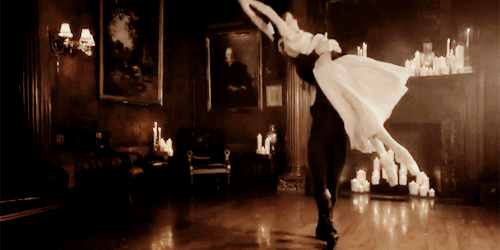
> Close Third Person POV still requires you to be mindful of your POV character. this is a rookie mistake i see allllllll the time. “Josh cried stupid tears at the beautiful display by the dancers,” is a sentence in Josh’s POV. “Stupid” tells us how he feels about the tears, “beautiful” tells us how he feels about the display. ok. all good so far. BUT.
“Josh cried stupid tears at the beautiful display by the dancers. It was everything he’d wanted from this production, from the lighting to the costumes to the exquisite choreography. Martha had to suppress a fond smile at his reaction; he was always so sweetly emotional after the curtain fell.”
Do you see what’s wrong with this paragraph? The first two sentences are Josh’s POV, and then the third one suddenly becomes Martha’s. A lot of amateur writers don’t even realize they’re doing this, which in its most egregious form is called “head-hopping,” but it’s disorienting and distracting for the reader, and makes it harder to connect with a single character. In multi-person close 3rd POV story, the POV should remain the same for an entire chapter (or at least, for an entire scene/ segment,) and change only between them. If you’re new to POV wrangling, watch your adjectives/ interiority (we’ll get to that in a second) and think “which character am I using as a lens right now, and am I being consistent" every once in a while until you get the hang of it.

> Related: let’s talk about interiority. Interiority is a more sophisticated way of thinking of a character’s “internal narration,” IE bits of prose whose job is not to advance the plot, set tone, or describe anything, (although it CAN do any of those things as well, and good prose will multitask) but to give us a specific sense of the character’s internal life, including backstory, likes, dislikes, fears, wants, and personality. In the above example paragraph, the middle sentence “It was everything he’d wanted from this production, from the lighting to the costumes to the exquisite choreography” Is interiority for Josh. It tells us that not only did he love the show, he’s very familiar with this art form and thus had expectations going in; likewise, listing the technical components is a way of emphasizing his enthusiasm while pointing out that it’s informed, implying that Josh himself is intellectually breaking down the performance even in appreciation.
“That’s a lot for a throwaway sentence you made up for an example.” Well, yeah, a little interiority goes a long way. Interiority is what creates the closeness we have to POV characters, the reason we understand them better than the non-POV characters they interact with. It’s particularly key in the first couple chapters of an original work, when we need to be sold on the character and understand the context they operate in.
If readers are having trouble connecting to or understanding the motivations of your character, you might need more interiority; if your story’s plot is agonizingly slow-moving (and you don’t want it to be) or your character is coming off as melodramatic, you might need less. It’s not something you should necessarily worry about; your amount of interiority in a WIP is probably fine, but being able to recognize it for what it is will help you be more mindful when you edit.
(Fanfic as a medium revels in interiority: that’s how you get 10k fics where nothing happens but two characters lying in bed talking and having Feelings. Or coffeeshop AUs that have literally no plot to speak of but are 100k+ long.)

> try not to describe the facial expression of a POV character, even in third person. rather like filtering, it turns us into a spectator of the character when they’re supposed to be our vessel, and since it’s *their* POV, there should be other ways available to communicate their emotion/ reactions. There are ways of circumventing this, (the example sentence where “Martha had to suppress a fond smile” is an example) where their expression is tied up in a physical action, or something done very deliberately by the character and therefore becomes something they would note to themselves, but generally, get rid of “[pov character’s] eye’s widened” and “[pov character] smiled.”
so that’s what i got! go forth and write with beautifully deliberate use of POV.
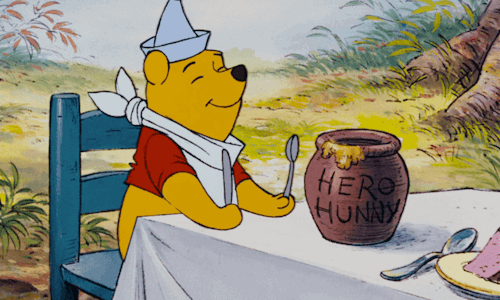
7K notes
·
View notes
Text
Yes to all of this
Dialogue Tips
While dialogue should be guided by reality, it shouldn’t directly imitate it. If you actually wrote out all the pauses and “ums” and all the other small slip-ups people regularly make, it would be unnecessarily hard to follow conversation. That said, dialogue still needs a natural flow to it that can come from things like individual speech patterns, perspective that shapes word choice, sentence fragments, etc.
Take the exposition out. Use regular exposition and context to convey information instead of trying to show it in dialogue. Any conversation shaped specifically around conveying info is going to start sounding “off” really easily, plus it’s a quick track to cheesy and fake-sounding writing.
Make sure dialogue matters. Just like any other part of a story, dialogue needs to move the story forward (or backward) with a purpose. “Meaningless” conversation shouldn’t exist, but not every word needs to be 100% plot-related. Conversations should change something about the story, or at least teach the reader something about a character, the plot, or setting.
Watch the tags. It’s best to use “said” as often as possible and save any different tags for when the line really matters. Too many different tags cause the reader to focus on the tags rather than what’s being said, and it can get cheesy rather quickly. (You can use “said” 100% of the time, but some people like to write with variance– and that’s okay! Just be aware of the effects that different tags can have because not all tags are actually tags, some are redundant and weaken writing, and others are distracting due to connotations.)
Over-tagging is a problem too. In cases of 3+ characters all participating, you may have to tag every line, but when there are just two people in a conversation then untagged dialogue allows for easier flow. You still have to remind the reader of the speaker about every 5 lines, but there’s no need to tag every single line.
It’s better to use an action than an adverb. Adverbs aren’t the end of the world, but they’re still “telling” and weaken your writing. When you want to convey that someone should be saying something a certain way, describe their body language or an action to show the emotion because it better shows the scene by providing a concrete image for the reader.
Different methods of speaking are better shown by word choice and overall syntax. Don’t purposefully misspell a word or write out an accent. It’s one thing to use slang, it’s another to twist the spelling so it imitates the speech on every line. Not only is twisted spelling hard to read and forces the reader to do extra work, it can get offensive in some cases. Loose grammar and sentence fragments are acceptable and allow for an expression of character individuality– spelling, clarity, and portraying a character with respect are the biggest issues here!
Avoid “talking heads” by not just having dialogue. There will definitely be brief moments where conversations snap back and forth between people, but majority of dialogue should not be “he said, she said” over and over again. This is typically a more common issue when the writer fails to have the characters do anything meaningful, often by separating their story into “plot action” and “plot dialogue” when a better writer combines them into the same scene, and even better, the same moment. If your characters aren’t able to do something during the conversation, then take some time to explore the setting or at the very least body language.
Dialogue shows personality. We all speak differently and so will characters. Some might be more formal than others, some may be more expressive, others can use more precise language, etc. Let dialogue show things about people– it can often save the writer the trouble of spelling it all out in exposition anyway, and it’s more fun for the reader.
Five sentences maximum per piece of dialogue is a guideline. In the case of a speech or monologue, this won’t be the case, but in the average conversation there shouldn’t be blocky paragraphs of speech. Even if your character actually needs to speak more than five sentences, try and break it up with description, scene interaction, or the other person saying something instead of just having a giant block of text.
Read more. One of the best ways to learn is to read, and novels all have a strong variety of dialogue for you to see examples from. Just remember to critique as you read, noting how the different methods of dialogue affect the story. Every choice has an effect and every effect matters to make sure you get the story you want to get across.
Read it out loud for pacing and flow. Read your entire story out loud, actually, but in the case of dialogue this technique can be extra useful for determining if it sounds natural or not.
Good luck with your work and if there are any questions, drop them in my ask box and I’ll see how I can help. Just please read my Rules and Considerations page to make sure I’m the best resource, and consider a Gift of Coffee to grant me an energy boost, if you’re feeling generous.
2K notes
·
View notes
Text
what society needs to understand is that friendship and romance are not ranks, tiers, or levels. they are not above or below each other. romance is not a promotion. friendship is not a demotion. romance is not “more than” being friends with someone. friendship and romance are concepts that exist on equal terms, side by side. sometimes they happen to coincide. other times they never intersect at all. how relationships are classified is up to the individuals involved but like?? neither is inherently more or less valuable is the thing
501K notes
·
View notes
Text
Writing Voice
Voice is a highly discussed subject in the writing community, but oftentimes treated less like a byproduct of skill and more like some godsend power you receive once you've become a Real Writer ™. Today I want to talk about why that's bogus and my thoughts on Finding Your Voice (And Why You Don't Need to Rush it).

I've been thinking a lot about voice lately, and how it equals to art styles.
These past few weeks I've seen way too many posts by newbie writers searching desperately for their own unique voices or bragging they finally found theirs, only to look at their stories and come face to face with dialogue buried in em-dashes instead of proper quotation marks. Freaking em-dashes. Which reminded me eerily of the posts I used to scroll through as a teen on Deviantart (a website where a lot of younger people posted their works) with people claiming simple anatomic errors as their ‘style’.
And I'll tell you the same facts I've been punched in the face by back then because they also apply to voice.
Voice is You
Both art and writing are very subjective, in contrast to brain surgery where you normally know the instant the person dies you've done fucked up. Style is like handwriting, first you have to learn how to trace letters correctly by going along the grey dot sheets your overeager elementary school teacher handed out and imitate the desired outcome to a T. Heh. See what I did there? Shush, you know I'm funny.
So you first learn to form the letters to a uniform standard of correctness, before later on, you deviate from it organically. For most people these deviations aren't intentional, they just happen. Because of the way, their hands tend to lean and their brains interpret curves.
The skill of forming letters and style are unrelated, and in an ideal case, the handwriting style shouldn't affect the clarity of the intended letters.
They work together, instead of against each other. And most styles develop over time naturally. There are some cases in which you want to write fancier and really push your style in a certain direction, add more curves and squiggle. Though most often than not these modifications barely leave any trace in the long run.
Abandoning the handwriting metaphor, in art, style is...well. I once heard someone say 'Style is the way you draw’. Which as simple as it sounds, was an eye-opener. Style, voice, is the ‘you’ in the work, it reflects your interests, your passions, the way your brain works and your preferences in other's artwork. It is logical your style reflects the techniques and subjects you heavily consume because it's what you gravitate towards, of course it shows in your work.
We are mirrors to our environment.
The same applies to the mysterious 'writing voice’ everyone seeks like mad. Voice isn't you randomly fucking with tried and true formatting rules, it's not the omission of learning basic writing skills. Voice and skills are separate, you can flaunt a unique voice and still be a shit writer. No - it's more an amalgamation of all the factors which define you as a person, it's the low curl of your voice when you're amused, your sense of humor and the way you relate to others, it's the way you speak and all the ways of speaking you wish you'd rather be capable of. All the styles of fiction you adore and themes that touch you.
Why You Don't Need to Rush
So there is no need to rush, to force 'finding’ a voice, you already have one, your skills only need to rise and your voice evolve, like an already pretty flower blooming for the first time. You already got what it takes inside of you and it will catch up as you grow as a person and writer.
Now we got all this cheesiness outta the way - let me tell you one last fact straight. You don't even need a 'unique’ writing voice. And if your voice stays a basic piece of bread for the rest of your life, it doesn't matter. Voice is just the decoration on the cake, a little bit of Oomph, and there is nothing wrong with normal chocolate icing instead of sugar roses, as long as the cake itself is skillfully made. And in my opinion chocolate icing has its own charm.
Pretty icing without a cake won't make anyone happy, won't satisfy anyone's hunger. So keep calm, take a deep breath, and concentrate on cultivating your skills and producing the best stories you currently can. Everything else will follow.
#writing#writing tips#writing advice#voice#writing voice#writing tip#writers on tumblr#creative writing
0 notes
Text
reasons to not quit writing:
your writing is a skill, not an inborn talent (unless, yeah, maybe it is). not everyone can do what you do and love
everyone says they want to write a book. everyone has what it takes to write a book. not everyone does it anyway. you be the small percentage of success you read about
your writing will always seem brickshit horrible because you wrote and read it a million times
you love this writing thingy. quitting it will be like cutting off your fingers one by one.
someone out there will want to read what you wrote.
someone out there wants to know what is on your mind.
someone out there appreciates your art. they will share it with their friends. they will share it with their loved ones. they will share it with their future self because maybe what you wrote saved them.
if you give up now, you know you will just come back to it again, whether it’s years from now, months, or next week. you love writing, that’s why you planted the seed of thought that you are going to write this book, and whether you come back to it or not, your unwritten stories will come back to you.
67K notes
·
View notes
Text
One of the most toxic pieces of writing “advice” I have ever gotten, bar none, is “real writers write every day!”
And yet I see it touted constantly by writers and those who support writers, often bringing up the example of “Steven King writes 8 hours every day!”
Here’s my counter-advice to anyone and everyone who has heard this “real writers write every day” crap.
It’s a lie. It’s an absolute, outright lie, to say someone can write every single day without fail. Even the people who do it professionally take breaks. Even the people whose entire livelihoods are based on the written word will take time out and just relax. And that’s not even bringing up writer’s block or anything similar to it, or just feeling like you don’t want to write today.
That’s all okay. I’ve spent weeks not writing before getting back to it, I’ve dropped projects and started them months later under new names, I’ve done all manner of things that so flagrantly fly in the face of the statement “real writers write every day” that frankly, for a long time, I started to think I wasn’t a real writer.
But that’s bullshit. You can take a break for any reason. Depression, work, illness, and and so forth may actively stop you from writing. You could spend time with your loved ones, or playing video games, or cuddling a dog, or going out to a bar, and choose to not write. That doesn’t make you a fake writer, it just makes you a human.
“Real writers write every day” is, and always will be, a lie. Don’t fall for it.
9K notes
·
View notes
Text
we need a nintendogs app i am sick of living like this
278K notes
·
View notes
